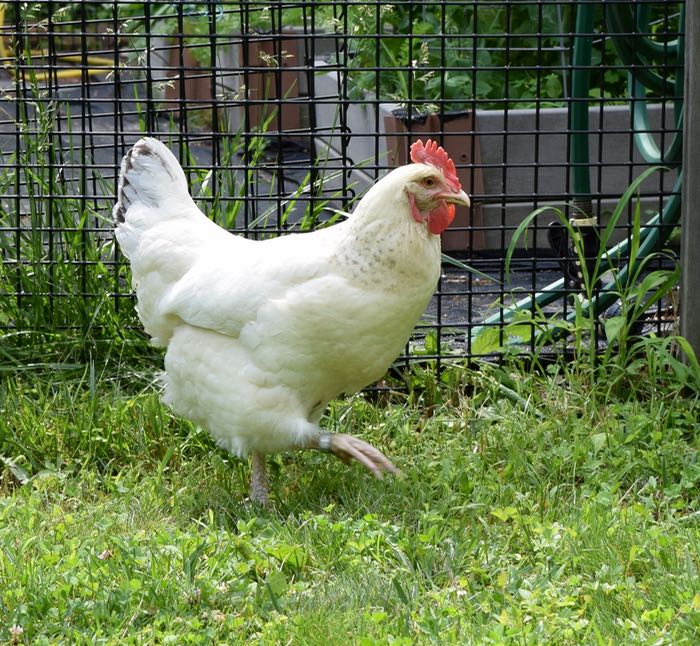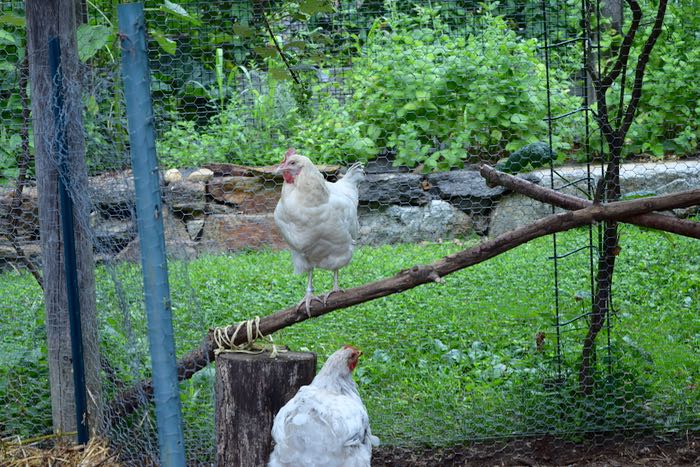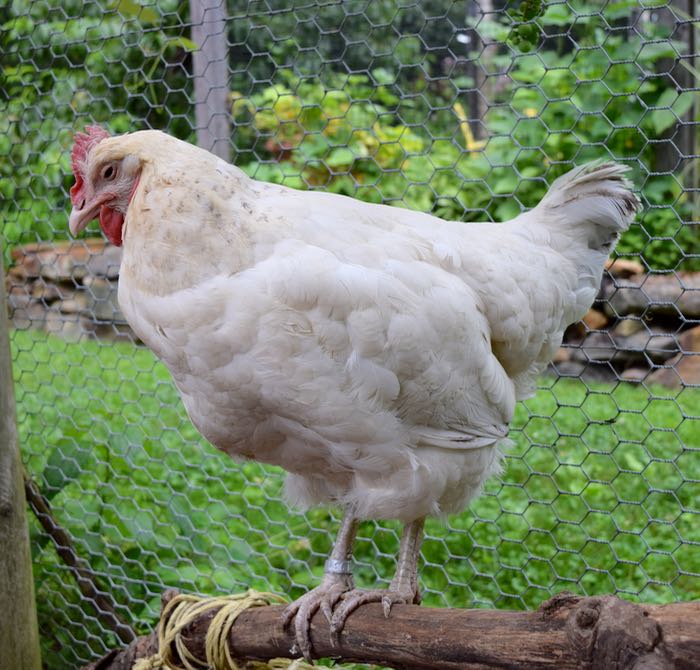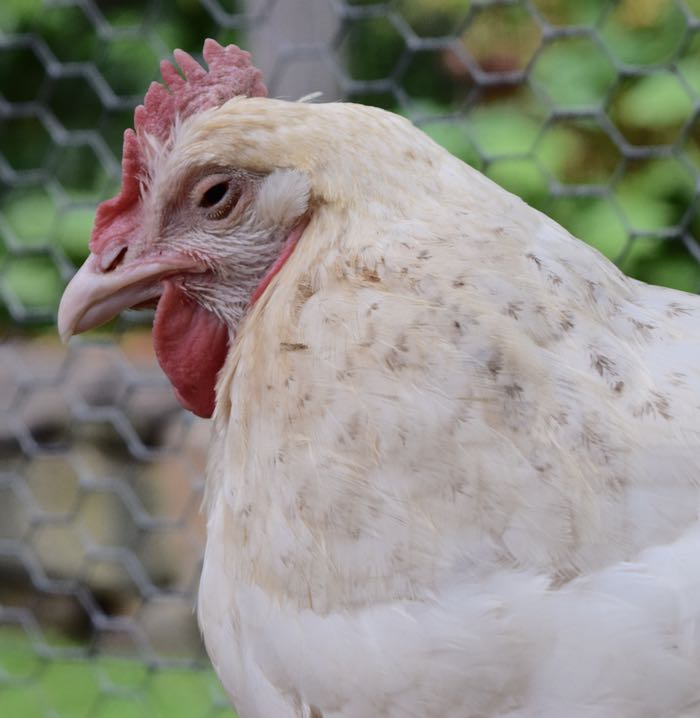I’ve been keeping an eye on Opal. I’ve been watching her slow demise. This is the part of the story that all of the everyone should have chickens in their backyard boosters don’t talk about. The truth is that chicken keeping is not easy.
Opal is a Delaware hen. The Delaware is a breed developed in the 1940s for meat. This was right before the cornish cross was invented, a hybrid which has forever changed the chicken industry because of it’s fast growth and rate of feed conversion into meat. Once that Cornish cross appeared, the Delaware was relegated to the a pretty hen to have in your home flock category. Opal was one of a batch of chicks that I purchased from a mail order hatchery four years ago. She’s been a pleasant member of the flock. But she’s had her health issues.
Opal, for whatever reason, contracted infectious bronchitis. She’s the only one of my hens which showed the symptoms – the telltale sign being wrinkled eggs. She survived that bout. But, those compromised eggs have caused laying issues. I don’t think that the eggs slide out easily like perfectly formed ones. Back in March she looked to be on death’s door, but the Spa Treatment brought her back enough to return her to the Gems and resume a normal life. However, knowing that the underlying cause hasn’t gone away, I didn’t think that she’d last the year, and my concern has been confirmed with signs – a paler comb, a reduced energy level, a cessation of laying and a messy bottom.
Despite that, in June Opal was enjoying outings on the lawn.
Look closely, though, and you’ll notice that her comb has gone whitish near the back. I’ve monitored the change in the comb as it shrinks and greys. I’m not going to try the Spa Treatment again. I know that what is going on inside of her cannot be cured. It does her a disservice to prolong whatever terminal ailment she has. So, I’ve watched and waited, and so far Opal’s quality of life has been good. She’s been eating, drinking, roosting and interacting with her flock.
But not today.
She’s on the outside roost. Looks okay from a distance.
Up close, though, there’s the sleepy eye. The ashen comb. The tucked in stance and drooped feathers.
Opal is done.
Chickens have a remarkable ability to stay alive despite being very, very sick. That’s the point at which Opal is now. I honestly don’t know how she processes pain at this stage in her life. Chickens don’t express suffering in ways that a human can relate to. But, I do know, that when a hen looks like this, that trying to keep them going by drenches and soaks and drugs does nothing but prolong whatever discomfort she is experiencing. At this point, the less that I do, the better. The other hens are leaving Opal alone so isolating her from the flock would do her no good, and would stress her. I’m hoping that Opal will pass peacefully in her sleep in the next day. If she doesn’t, I won’t let her starve to death and will euthanize her.
This is the reality of backyard chicken keeping. Animals under your care will die. Chickens have short lives. They’ll die sooner than you think. For those of you with only three or four hens, this can feel devastating. Even for someone like me who has a dozen hens and has kept a flock for twenty years, the loss of a bird is difficult. But, it helps to accept your limits as a caregiver. It helps to recognize that within the world of backyard hens, that this is normal. It helps that I know that I have given my animals the best care possible, so that while they’re here, they have a good life. And then it helps to let go and move on.





Poor Opal. Since animals don’t come with a Misery Meter you have to add up all the signs yourself. Luckily you’re observant and experienced. I very much regret keeping my cat alive when she was terribly unwell and not going to recover. It doesn’t do them any favors, no matter how much you love them and how reluctant you are to let go.
Thanks for the reminder — we’re going through the same thing with our other old cat now. I hope I’ve learned my lesson.
I love the new cam – thanks to both you and Steve; whilst on it yesterday, I did notice that Opal did not look good and you are right in everything that you say. I’ve enjoyed watching her over the past couple of years and, if my memory serves me right, when you got that batch of chicks wasn’t there another Delaware which turned out to be a ‘he’?
Yes, we did have a Delaware roo who I found an excellent home for, with a free-ranging farm flock. But, within the year he appeared to die from a heart attack – looked healthy, died while running mid-stride!
I haven’t gotten to,experience a hen dying, but 2 chicks being killed by a hawk. I was distraught, thinking “Why are they harming such innocent animals?!” Thankfully, we now have a screen over their run, so hawks will leave them alone.
I worry about the day that mine will die. They’re about a year old now, but I still worry.
So sorry about Opal, she honestly loves your coop enough to keep on fighting through the pain.
Poor Opal she was always my favourite, it was lovely to see her out on the grass and on the first day the new cam was working I was lucky that i did get to see her. So glad you will not let her suffer.
So sad. I noticed Opal yesterday not looking so swift. She stayed on the perch in the pen most of the day. Then I saw her come out of the coop this morning and saw her comb (dull) and just how she was acting. I knew she was sick. And went right back up on the perch. You give them such great and happy lives. Hope she passes painlessly. They are some lucky hens. I love watching Misty and Amber. So sorry for the loss.
Miss Opal, a pretty and sweet hen. She won the chicken lottery when she came to your flock.
You take great care of your hens. Opal has been lucky. Thank you for this post. I know opal will be issued when she goes.
I had to euthanize two hens in the five years I have had chickens. One got her neck stuck in something I never figured out.. just found her with a hole in her neck and saw that food was coming out of it. I had a friend who has more courage than I put her out of her misery. I couldn’t even watch. The other hen had a large mass growing on her and the vet was out to the farm for spring shots. I had her look at the hen and she said, oh this isn’t good at all. I asked if she could put her to sleep gently, and she did with a needle. How do you do it yourself? What do you feel is the best method? Not sure I could do it at all anyway, but it’s good information to know.
It can be difficult for a vet to euthanize a chicken. (The way the drugs work and finding a vein to inject it into.) We have euthanized in two ways – breaking the neck, or chopping it off. Both are instantaneous. But both are hard to do.
Poor Opal! She is a lucky gal to have a home where she was so well cared for. We’ll miss her.
I’m so sorry for your predicament. I’ve been through it too, and it hurts because no matter how many critters I have, I get attached to and care for all of them. I have an elderly rooster that I’m caring for now, and every day that he limps around is a good one!
Sorry honey… A bit of us goes with each hen that passes on, doesn’t it? At times my love for our chickens is a bit too much, and I have to smack myself a little bit and remind myself how short they really live. So, I love em, kiss their chicken faces and make sure they know they are loved with all the good care I can muster for them.
— Ya know, when I have a hen leave, I’ve never had the others peck or abuse them. Honestly, it’s been wonderful to watch (In a way). Some actually go sit with a dying hen and just be with them. Then, when one gets up and goes away, another has come and sat with her. Almost like a vigil. That’s one of the interesting things I learned about my hens. I’ve also seen them mourn the passing of a hen. Some of the hens, (usually one they like to roost next to) just seem listless and not interested in eating for a day or maybe two even… Then they perk up and go back to being normal.
((comfort hug))
Gin
Thanks Gin. But, I do want to remind people *not* to actually kiss their hens – it’s a good way to pick up salmonella from them :)
Are your hens banded? If so, why and by whom?
The State of Massachusetts has regulations about chickens – to move birds off your property, your flock has to be blood tested yearly for diseases that chickens spread to other chickens.
Opal is a beautiful hen. And your last paragraph should be the credo of all animal owners.
Poor Opal, I am sure she had the best life a chicken can have.I hope she does go peacefully in her sleep. I usually only keep 2 hens at a time and I am always so sad when one passes away. I have a 3 year old and a 1 year old hen now and I hope they live a long time. I heard that the heavy egg layers usually die at 3 or 4 so I have Cochins now because they are not big egg layers so I thought they might live longer.
I noticed Opal seemed more active today. Enjoying her day.
Sorry to hear Terry. It’s so hard when you know one of your animals is failing.
So sad for Opal, but thank you for that last comforting paragraph. I first took up chicken-keeping 4 years ago with 3 Barnevelders and was devastated when the first one had to be put down after a couple of years. I lost the second one only 4 months ago, but had bought 3 more in the meantime. The last of the original three is 4 years old now and still laying. The 3 new ones are a delight and I’m gradually learning to let go and move on when I lose one. Thank you for your inspiring blog from which I’ve learned so much.
I too have kept chickens for over 20 years and your right about it just a part off raising them. You said so elegantly.
So sorry to hear about Opal. I too have gone through multiple losses over the years and it is never easy. Your post above has comforted me greatly knowing how it is a normal process and something we have to accept going in when you decide to raise chickens. You are right, very few out there who promote backyard chickens mentions the darkside. Its a shame you have to experience it first without some kind of info to help up front.
Do you normally replace your hens when they pass? Just wondered if that helps to ease the loss somewhat.
Good question about replacement. It is upsetting to the flock to add a new hen (and hard on the new hen.) What I’ll do is wait until I have fewer chickens, and will combine both of my flocks. Then, I’ll get chicks and start a young flock again. This way I have the “retired” girls and a laying flock.
{{{HUGS}}}
So sorry to hear about Opal. Thank you for sharing.
It is the hardest thing about having animals. Even having a big farm with animals or small hobby farm, animals bring a gentleness to our lives. They are so accepting of we the humans. They are forgiving of our imperfections as we make mistakes in our care of them. I love my animals, dog, cat, chickens…..they bring joy to my life. I so appreciate your wisdom with animals and how you share the joys and the sad times.
I guess we never really get “used” to dealing with end of life issues with our flock or any of the animals we care for day in and day out, but I surely do appreciate your no-nonsense tone and point of view, Terry.
You’ve given Opal way above average care with the spa treatment back in March and I believe before that, also.
She has been a lovely, beautiful glimmering white bird with a lot of personality and charm within your flock and for that we are all grateful.
Thank you for once again reminding us of the reality of keeping a backyard flock. It’s not for everyone but if you are made of the right stuff and recognize the flocks role, as well as your own…well, it’s an awesome adventure!
I’m sorry about Opal. We are in the midst of something similar in our back yard. Our Barred Rock hen from our first batch of chicks 4 years ago has been going downhill lately. It’s so hard to see her like this. I have researched her symptoms and it’s almost impossible to determine what could be wrong. She’s still eating with gusto so I am at a loss for what to do. She’s had many spa treatments and pampering. It breaks my heart because she has always been our favorite…my son used to hold her in the palm of his hand. So we’ve been treating her well….we just want her to know how loved she is. <3
If her keel bone is sticking out and if she’s losing weight, then you know that something terribly wrong is going on inside of her – even if she’s eating she might not be able to process it. That was the situation with Opal.
Rest in Peace Opal, I will remember you as the elegant regal lady you once were. Sending a big hug your way.
Terry- My husband and I attended a chicken keeping class of yours 3 yrs ago. We had 4 black austolorpes. The class was so informative and helpful. Unfortunately, I lost a third hen last week. I looked through your FAQ’s and couldn’t find anything about having a lone chicken. She was lost the first couple days bawking and calling for her sister, but has since calmed down. I called a local farm that said they would take her but she would be caged. I could never do that to her! So, I still have her. I miss my girls so much, but with my ailments recently, I can no longer start a new flock. My question is…..can they die from being lonely or in winter, not having another hen to perch up against?
Having one hen isn’t the best situation, but it’s okay. I’m sorry you’re not well enough to get more hens, so for now, enjoy the one you have. She’ll be fine in the winter if you give her nice deep bedding and keep the coop free of drafts. Indulge her with cucumbers and melons now, and feed her pumpkin in the winter and she’ll be plenty fine and pampered.
Thank you so much. I am on heart meds and your answer relieves the stress worrying about my lonely girl. We have a pond, so hubby was thinking to maybe get 2 mallards, cuz if they fly. its not a big deal….sorry, I ramble, thank you!
I ramble, too :)
What a beautiful old lady she is. She had a great life with you Terry!!
She was a particularly amenable hen.
I recently lost Sparkle, my silver laced wyndotte. She had a bit of a crackle in her breathing so I took her to the vets and she had antibiotics which cleared it up but she then laid a couple of eggs with no shells. After that she went down hill and refused to eat despite my best efforts to hand feed her treats. She became thin and I could see she had given up. The day I made the decision to take her to the vets to be PTS she looked just like Opal with her eyes half shut. I knew she was done and I couldn’t let her starve herself to death. The vet gave her the injection and she went to sleep in my arms while I sobbed over her. Your post helps me to know that it was the right decision.
You did the right thing. Condolences on your loss.
I lost my Lulu Monday. its been terribly hot and I have done all the tricks to keep them cool. it was hard to step back and do nothing. I sat on a chair outside the coop for hours. went in the house to get a drink and she was gone when I came back out. it helped to read you post. Thank you for sharing.
Sorry for your loss. Sometimes doing nothing is the right thing.
Terry, so sorry to hear about Opal. You are so compassionate in these situations and thank you for the lesson of how to deal with it. I have lost a couple of hens over the years and it was difficult to lose something I raised and nurtured. It made me feel good knowing they lived a good life and it’s all part of the circle of life. Can’t wait to see your future flock of chicks running around!
You’re welcome.
So sorry about Opal, but so glad she got to spend her life with you. Lucky girl.
Thank you for this post. It couldn’t have been easy to write, but the information is invaluable. Even thiugh my first flock is barely 18 weeks old and not yet laying, I’m now better prepared for this kind of situation. Thank you again.
That’s what I’m hoping happens because of my writing. The more we know, the better decisions we make.